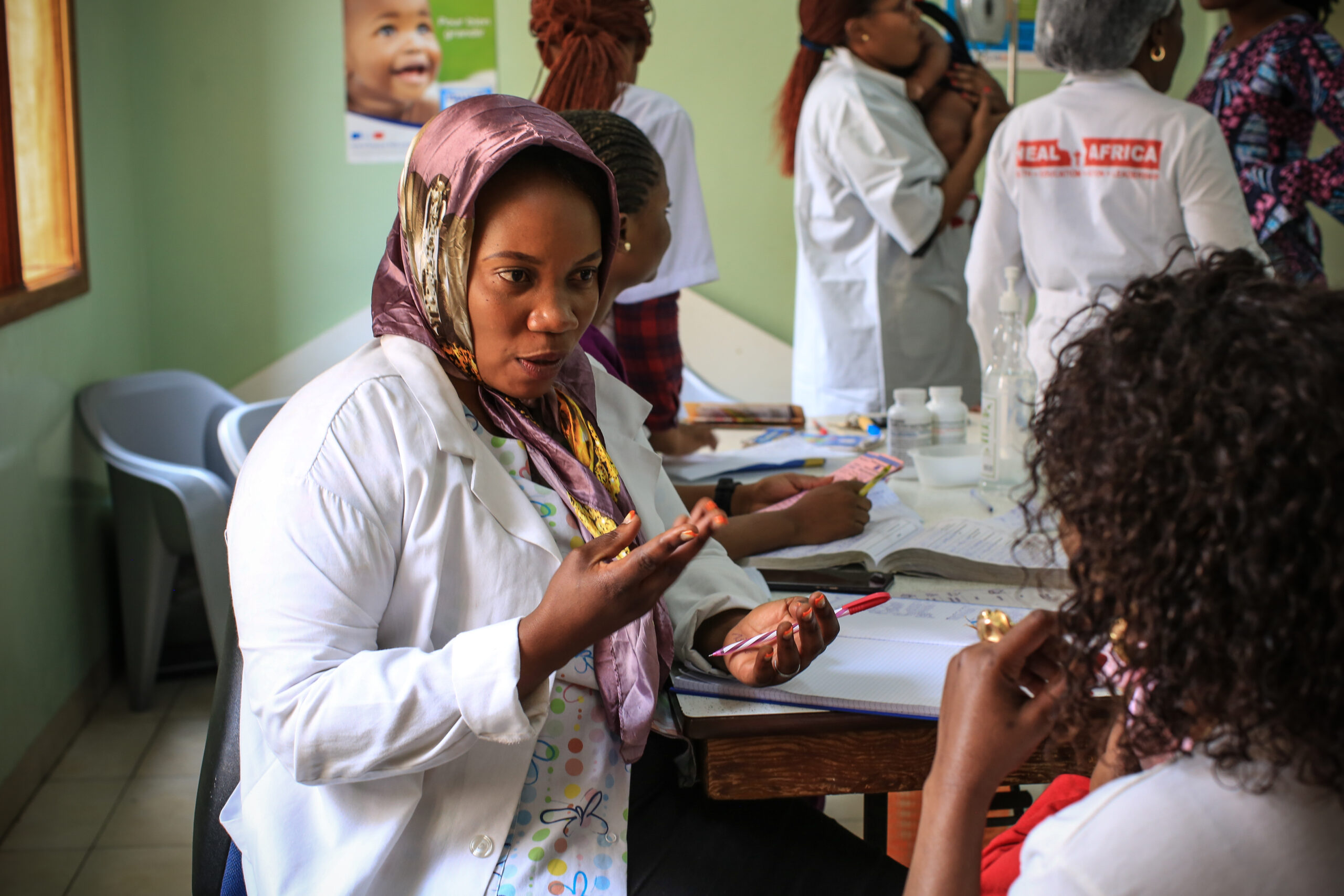
Searching for new avenues to control cholera

Florence Kamando provides cholera prevention information in a displacement camp in Goma, DRC. Photo: PATH/Ley Uwera.
Cholera, a bacterial disease that leads to rapid dehydration, has afflicted humanity for centuries. Left untreated, it can be fatal. The Vibrio cholerae bacterium has seasonal spikes and can easily spread from one region to another, making containment difficult.
Oral cholera vaccines (OCV) have been a game-changing intervention since they became available in 2013, complementing other diarrhea control efforts like improved sanitation and oral rehydration salts (ORS) and zinc to treat dehydration. Yet the alarming increase in cholera outbreaks in recent years fueled by global shocks like conflict and climate change, have renewed interest in the development of additional tools to help us keep pace. Researchers described a few of these early-stage innovations at a recent Global Task Force on Cholera Control webinar.
Wielding virus against bacteria
Bacteriophages, or phages, are viruses that infect and kill bacteria. This approach takes advantage of the ongoing evolutionary arms race between viruses and bacteria. Phage treatment for bacterial infections has been used in Eastern Europe for almost a hundred years.
Preclinical research on a three-phage cholera cocktail suggests it has the ability to provide protection after cholera exposure. These phages act within hours and can replicate enough to eliminate infection once they enter the human body. The capsules that protect the phages against stomach acid also protect against heat and humidity, allowing for distribution and storage without refrigeration.
The approach under current consideration is a once-daily oral capsule for seven days during the high-risk period after a cholera diagnosis in a household. Forthcoming clinical trials will assess its performance in endemic and emergency settings and in travelers.
A sprinkle of protection
Researchers are developing a new type of food supplement derived from immunoglobulins that bind to the cholera toxin and prevent gut infection. These binding proteins, a powder mixed into food products, block the interaction between cholera toxins and intestinal receptors and reduce cholera-related diarrhea.
In preclinical disease models, these binding proteins significantly reduced weight loss caused by diarrhea, limited intestinal fluid accumulation, and stopped the growth of cholera bacteria and its toxin in the small intestine. Clinical studies will begin once safety and toxicity studies are complete.
Researchers envision that in outbreak settings, this supplement can be provided at an oral cholera vaccine (OCV) session to protect the gut for the necessary days until vaccine-induced immunity kicks in. It could also be available to a larger at-risk population during the cholera peak season.
Novel antidiarrheal treatment targeting cholera
Cholera bacteria produce a toxin in the intestine that causes diarrhea and rapid dehydration. To prevent cholera patients from dying, it is critical to rehydrate them with oral rehydration solution (ORS) or intravenous fluids. These methods help replenish the fluids and salts that are lost through diarrhea and ultimately aid in the elimination of bacteria from the body. However, while fluids prevent the lethal symptom of cholera (dehydration), they do not resolve diarrhea.
Recently, researchers have focused on the use of antidiarrheal drugs to treat cholera and other major acute watery diarrheal diseases by stopping diarrhea itself. A challenge is that, during a diarrhea infection, these medicines can pass through the digestive system too quickly to be absorbed. To address the intestinal washout that renders the drugs ineffective, researchers are advancing a drug that inhibits fluid secretion induced by the cholera toxin. In preclinical research, the drug reduced intestinal secretion and mortality, and survival rates improved.
The researchers envision that the drug will help stop diarrhea in less than 12 to 24 hours with just one capsule, eliminate the need for intravenous rehydration, and reduce in-patient time. It is ideal for high-risk cholera settings because it does not require refrigeration or special storage requirements. Early-stage clinical trials are underway.
Alongside acceleration of focused, prompt prevention of cholera outbreaks, enhanced case management would be a welcome development as we work toward the goal to reduce cholera morbidity and mortality by 90% in 2030. It is essential to continue investing in these efforts.


